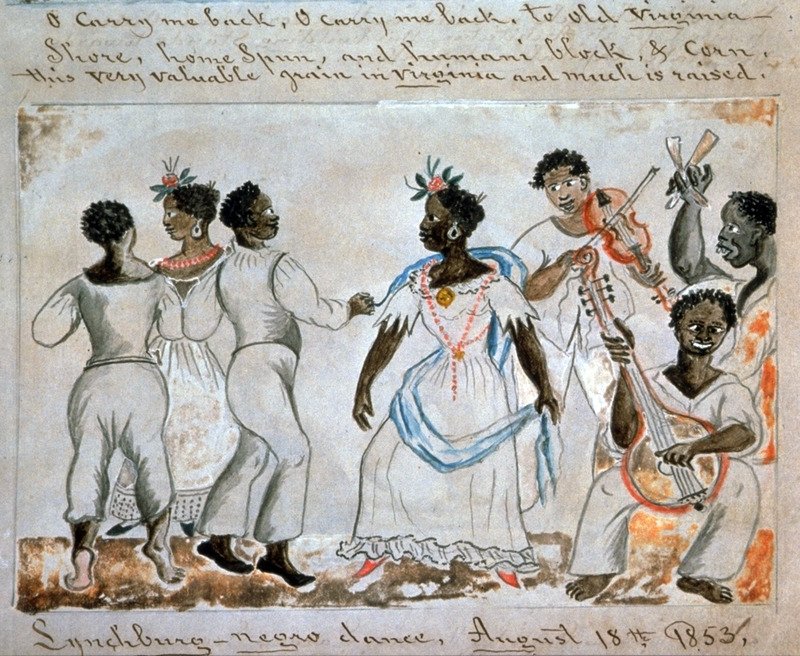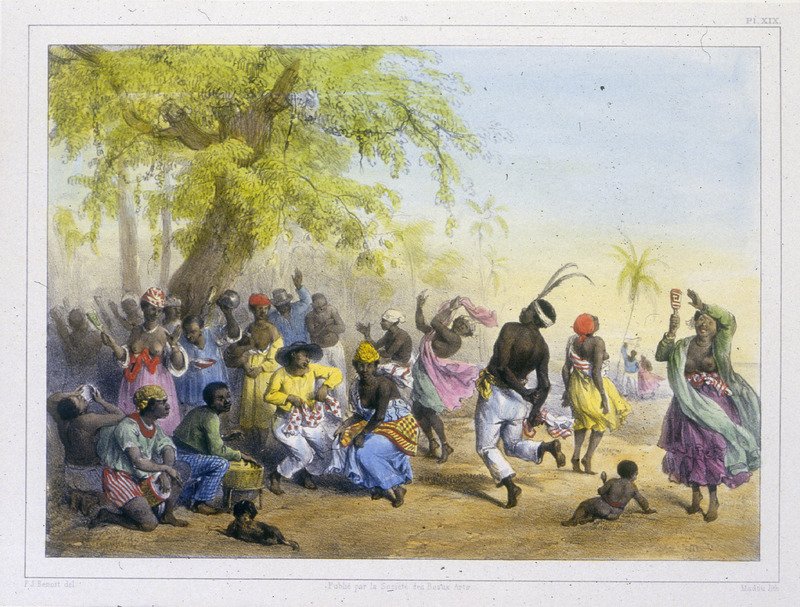
Music of Early Black Virginians
About
The Music of Early Black Virginians is a multi-year, multi-phase project. Our goals are to document, study, and engage musically with the performance practices of enslaved and free African Americans in the mid-Atlantic region, pre-Civil War.
Documentation: A team of undergraduate and graduate researchers is collecting descriptions of and references to all kinds of music making; those findings are published in a searchable database here.
Study: We hosted a symposium in June, 2022, at George Mason University, where we will bring together experts and curious scholars and performers to both study and experiment with the practices outlined in historical documents. You can learn more about the symposium here! We are also developing a related syllabus, to be shared publicly, that engages students in similar study and experimentation.
Engagement: We will facilitate performances at historically appropriate places around Virginia, featuring techniques, repertoire, and general approaches learned from our process. We aim to engage students and community members with as much depth as COVID- and post-COVID life allows.
Meet the Team
-

Emily H. Green
PROJECT LEAD
Emily H. Green is Associate Professor of Music at George Mason University. Partly because she is raising her family in Northern Virginia, her scholarly thinking since 2019 has turned towards the written and silent histories of Black musicians—and the role that music performance has played inside and outside Virginia’s participation in the slavery economy. Recently, she has been named a Fenwick Fellow at George Mason University, and her work with Bonnie Gordon, Michael Nickens, and Mary Caton Lingold on The Music of Early Black Virginians has won a 4-VA grant. Before 2019, her scholarly work focused on the practical history of music-making: how composers and publishers used printed music to communicate to their publics in the eighteenth and nineteenth centuries. On that subject, she has written Dedicating Music, 1785–1850, has co-edited with Catherine Mayes Consuming Music: Individuals, Institutions, Communities, 1730–1830, and has published articles in the Journal of American Musicological Society, Eighteenth-Century Music, the New York Times, NewMusicBox, and other outlets. She also plays keyboard instruments.
-

Mary Caton Lingold
PROJECT LEAD
Dr. Mary Caton Lingold is Assistant Professor of English at Virginia Commonwealth University. She is an interdisciplinary scholar specializing in the literature, culture, and music of the early modern African Atlantic world, sound studies, and digital humanities. Her current book project, “Sound Legacy: Music and Slavery in an African Atlantic World,” is under contract with UVA Press. Previous publications include Digital Sound Studies (Duke 2018), as well as articles in Early Music, Studies in Eighteenth-Century Culture, and Early American Literature. In 2021, she guest-edited a special issue of Reviews in DH on the subject of sound.
Mary Caton received a PhD in English and a graduate certificate in African & African American Studies from Duke University in 2017. Prior to that, she earned an MA from the University of Colorado at Boulder and a BA from Trinity University in Texas. Growing up in the rural U.S. South shapes her interest in Atlantic slavery, white racism, and Black history and culture. Much of her research focuses on on the Caribbean, a region key to the development of traditions and ideas that spread across the Atlantic world in the early eras of slavery. Mary Caton is a lifelong musician, and she enjoys singing and playing multiple instruments, especially bluegrass fiddle.
Photo by Eduardo Montes-Bradley.
-

Michael Nickens
PROJECT LEAD
Dr. Michael W. Nickens (a.k.a. Doc Nix) is Director of Campus Life Ensembles and Collaborative Arts, and an Associate Professor of Music. He is most recognized as the leader of the “Green Machine”, which in 2015 was named the #1 pep band in college basketball by the NCAA and commended by the Senate and House of Delegates of the Commonwealth of Virginia. In addition, Dr. Nickens launched Mason’s fife and drum corps and WGI world-champion drumline, and oversees Mason’s winterguard. This collection of performing units, known as the “Green Machine Ensembles”, are internationally known for their thrilling, high-energy performances at Mason ceremonies and basketball games, professional sports games and events (Capitals, Nationals, Wizards, and Redskins), community events (Celebrate Fairfax, and the Nike Womens’ Half Marathon), and marching competitions, as well as their popular internet videos that have over 100 million views collectively.
-

Bonnie Gordon
PROJECT LEAD
A music historian who works across disciplines and creative practices Bonnie Gordon is fascinated by the idea of sound as fundamental to the ways we move through the world and deeply committed to the idea that learning about sound is not for musicians only. She is a founding faculty member of the Equity Center and founded the Arts Mentors a program designed to increase access to the arts in Charlottesville. Her research centers on sound and gender in the early Modern world. In addition to her scholarly work, she has published in the New York Times, Washington Post, Slate and the Cville weekly. She plays jazz, rock, and classical viola.
-

Domenic "Shodekeh" Talifero
FEATURED ARTIST
With 36 years of personal, professional and community-based experience, Dominic “Shodekeh” Talifero continues to make musical strides as a groundbreaking and highly adept Beatboxer, Vocal Percussionist and Breath Artist who pushes the boundaries of the human voice within and outside the context of Hip Hop music and culture. As the first vocal percussionist to do so, he formally served as a dance technique musician and composer-in-residence for Towson University’s Department of Dance for 12 years and is the founding director of Embody, A Festival Series of the Vocal Arts.
Shodekeh recently served as Towson University's very first Innovator-in-Residence from 2019 - 2022, a historic designation which was anchored by the College of Fine Arts & Communication, allowing him lecture, collaborate, experiment, compose, perform and conduct research within the departments of Music, Art + Design/Art History/Art Education, Dance, Communication Studies, Electronic Media + Film, Mass Communication, Theatre Arts, Arts Integration & Interdisciplinary Arts Infusion, as well as the Asian Arts & Culture Center of TU, the TU Community Art Center, TU Community Dance & the TU Center For The Arts MFA & Main Gallery.
In previous years Talifero served as music faculty of the American Dance Festival at Duke University and has served as the chosen musician for a variety of master class experiences led by such luminaries as Ailey II of Alvin Ailey American Dance Theater, the Paul Taylor American Modern Dance Ensemble, and the Bill T. Jones/Arnie Zane Dance Company.
This deeply synthesized relationship with dance has also played a tremendous role in Shodekeh’s sustained & pioneering development of ‘Breath Art”, which is essentially the deep practice and extensive research of isolated creative breathing techniques and methods maintained within the musical and kinesthetic modalities of universal human vocal expression. This practice of "Breath Art" is exemplified in his commissioned work for the Covid-19 sculptures created by Rebecca Kamen for the 2021 exhibition "Reveal" at the American University Museum and his cymatic / sound art composition "Vymatics" for the 2022 world premiere event of "Voyages", a new immersive science communication series based at the National Aquarium in Baltimore, MD.
He serves as the Beatboxer and vocal percussionist for Alash Ensemble, one of the world’s leading Tuvan Throat Singing ensembles from Southern Siberia, and features as a guest artist on their Smithsonian Folkways album release “Achai”, as well as a co-curator and executive producer on the recently released album “Embodiments” with Bady Dorzhu Ondar of Alash. He has also become a regular collaborator with So Percussion, with whom he performed at Carnegie Hall in 2021.
One of Shodekeh’s most recent and by far bravest endeavor has been the recent establishment of his own collection and living archive with the Towson University Special Collections and University Archives in 2021, entitled “Ideations of Potential: Shodekeh's Innovation Lab of Embodied Scholarship & Hip Hop Imagination". This lifelong collaboration is the first Hip Hop-based archive created in the state of Maryland and the first Beatbox / Breath Art driven archive instituted in the world, with the expressed and dedicated mission of maximizing the collection as a platform for raising awareness on the epidemic of black youth suicide and ideation.
Event
Performing Early Black American Music: An Exploratory Symposium

